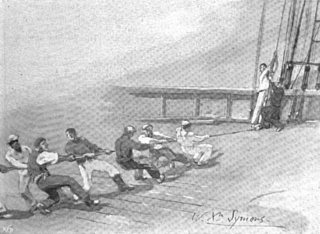Thomas Somers can refer to:
- Thomas Somers (athlete) (born 1997), British sprinter
- Thomas Somers (investor), American investor
- Thomas Somers (sailor) (1909–1984), British Olympic sailor
Thomas Somers can refer to:
Ceres most commonly refers to:

The keel is the bottom-most longitudinal structural element on a vessel. On some sailboats, it may have a hydrodynamic and counterbalancing purpose, as well. The laying of the keel is often the initial step in the construction of a ship. In the British and American shipbuilding traditions, this event marks the beginning date of a ships construction.
Thomas King or Tom King may refer to:

A sea shanty, chantey, or chanty is a genre of traditional folk song that was once commonly sung as a work song to accompany rhythmical labor aboard large merchant sailing vessels. The term shanty most accurately refers to a specific style of work song belonging to this historical repertoire. However, in recent, popular usage, the scope of its definition is sometimes expanded to admit a wider range of repertoire and characteristics, or to refer to a "maritime work song" in general.
John, Jon, or Jonathan Robertson may refer to:

Impressment, colloquially "the press" or the "press gang", is the taking of men into a military or naval force by compulsion, with or without notice. European navies of several nations used forced recruitment by various means. The large size of the British Royal Navy in the Age of Sail meant impressment was most commonly associated with Great Britain and Ireland. It was used by the Royal Navy in wartime, beginning in 1664 and during the 18th and early 19th centuries as a means of crewing warships, although legal sanction for the practice can be traced back to the time of Edward I of England. The Royal Navy impressed many merchant sailors, as well as some sailors from other, mostly European, nations. People liable to impressment were "eligible men of seafaring habits between the ages of 18 and 55 years". Non-seamen were sometimes impressed as well, though rarely. In addition to the Royal Navy's use of impressment, the British Army also experimented with impressment from 1778 to 1780.
Paul Anderson may refer to:

Sea Venture was a seventeenth-century English sailing ship, part of the Third Supply mission to the Jamestown Colony, that was wrecked in Bermuda in 1609. She was the 300 ton purpose-built flagship of the London Company and a highly unusual vessel for her day, given that she was the first single timbered merchantman built in England, and also the first dedicated emigration ship. Sea Venture's wreck is widely thought to have been the inspiration for William Shakespeare's play The Tempest.
Thomas, Tom, or Tommy Kelly may refer to:
Tom, Tommy, or Thomas Fitzpatrick may refer to:
Thomas or Tom Mitchell may refer to:
John James may refer to:
Thomas Price may refer to:
Thomas or Tom Webster may refer to:
Keith Thomas may refer to:
Thomas English may refer to:
Belsky is a Russian surname. When transliterated as Bielski it can also refer to a Polish family of the same name.

Three Sailors and a Girl is a 1953 Technicolor musical film made by Warner Bros. It was directed by Roy Del Ruth and written by Devery Freeman and Roland Kibbee, based on the George S. Kaufman play The Butter and Egg Man. Ray Heindorf was the musical director, with orchestrations by Gus Levene, and vocal arrangements by Norman Luboff. Choreography was by LeRoy Prinz.
Thomas Jacobsen may refer to:
Thomas Jordan may refer to: